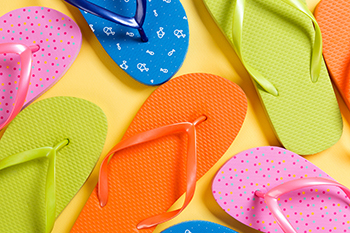
Flip flops are popular shoes to wear in the spring and summer months. They are easy to slip on and off and are available in various colors. Despite the simplicity of wearing these types of shoes, research has shown they may not be ideal for overall foot health. The feet work differently in shoes that do not have a back, forcing the toes to grip the front of the shoe. They can have a negative impact on the arch, and heel pain may develop. There may be tension in the front of the ankle and the toes, and performing specific stretches may help to reduce it. A calf stretch is effective in properly stretching the heel and Achilles tendon. This is done by standing on a step and lowering the heels one at a time until a gentle stretch is felt. There are other alternatives to wearing flip flops, and if you are interested in learning about what type of shoes these are, it is suggested that you consult with a podiatrist who can provide you with the correct information.
Flip-flops can cause a lot of problems for your feet. If you have any concerns about your feet or ankles, contact Dr. Richard Silverstein from Union Foot Care. Our doctor will assist you with all of your foot and ankle needs.
Flip-Flops and Feet
Flip-flops have managed to become a summer essential for a lot of people. While the shoes may be stylish and easy to slip on and off, they can be dangerous to those who wear them too often. These shoes might protect you from fungal infections such as athlete’s foot, but they can also give you foot pain and sprained ankles if you trip while wearing them.
When Are They Okay to Wear?
Flip-flops should only be worn for very short periods of time. They can help protect your feet in places that are crawling with fungi, such as gym locker rooms. Athlete’s foot and plantar warts are two common fungi that flip-flops may help protect your feet against.
Why Are They Bad for My Feet?
These shoes do not offer any arch support, so they are not ideal for everyday use. They also do not provide shock absorption or heel cushioning which can be problematic for your feet. Additionally, you may suffer from glass cuts, puncture wounds, and stubbed toes since they offer little protection for your feet.
More Reasons Why They Are Bad for Your Feet
- They Slow You Down
- May Cause Blisters and Calluses
- Expose Your Feet to Bacteria
If you have any questions, please feel free to contact our office located in Havre de Grace, MD . We offer the newest diagnostic and treatment technologies for all your foot care needs.
